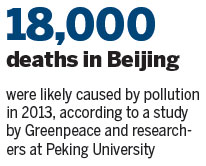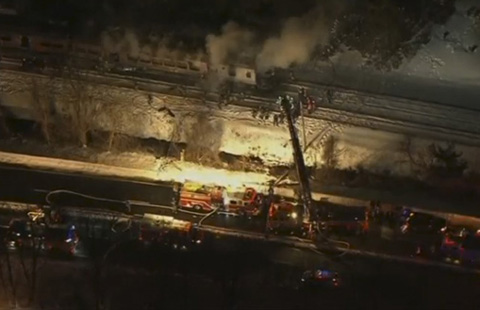Study: PM2.5 kills like smoking
Updated: 2015-02-05 07:40
By Zheng Jinran(China Daily)
|
||||||||
Premature deaths related to PM2.5 pollution in 31 major Chinese cities reached 257,000 in 2013, making it a major killer equivalent to smoking, according to a yearlong study released on Wednesday.
The study, conducted by Greenpeace, the environmental protection group, and Peking University's School of Public Health, took each of the 31 major Chinese cities' average PM2.5 concentration and applied a World Health Organization model to estimate health effects.
It focused mainly on four conditions, including lung cancer and stroke, which have been tied to exposure to the fine particulate matter.
The WHO model is authoritative, said Pan Xiaochuan, professor of public health at Peking University and one of the study's authors.
The study said there were around 90 premature deaths for every 100,000 people from PM2.5 pollutants, which are airborne particles smaller than 2.5 microns in diameter that can penetrate the lungs.
That means, for example, that in Beijing, pollution-related deaths would have exceeded 18,000 in 2013.
The rate was higher in heavily polluted cities like Shijiazhuang, Hebei province, and Jinan, Shandong province, the study said, adding that the number of deaths caused by PM2.5 pollution may equal those from smoking.
Some public health experts were skeptical of the claim, saying that because PM2.5 pollution affects human health over time, it may take a decade or two to quantify its effects accurately.

While they shared concerns about PM2.5 pollution's adverse effects on human health, some took issue with the details of the study.
"The country has started to investigate the health effects, but it will take one or two decades to get results based on long-term tracking of some patients," said Zhi Xiuyi, head of the Lung Cancer Diagnosis and Treatment Center of the Capital Medical University.
He said air pollution could exacerbate some diseases, such as those related to the lungs, and lead to delays in recovery, but it's hard to say that PM2.5 pollution was the major factor in a death.
Moreover, some of the 31 used in the study did not release data on PM2.5 in 2013, he said, leading him question the results.
"I think that the results could be inflating the number of deaths related to PM2.5 pollution due to multiple factors," Pan said, although he said it's legitimate to seek understanding about the effects on human health.
Dwight Clark, Medical Director of US-Sino HeartCare in Beijing, said every increase of 5 micrograms per cubic meter of PM2.5 particles means an 18 percent increase in lung cancer.
However, he stressed that no matter what numbers are released from various organizations, the people and governments should notice that air pollution is bad and getting worse.
zhengjinran@chinadaily.com.cn
(China Daily 02/05/2015 page3)

 Snowboarder towed by a plane reaches speed of 78mph
Snowboarder towed by a plane reaches speed of 78mph
 Business opportunities of 'Year of the Sheep'
Business opportunities of 'Year of the Sheep'
 Italy's new president gets unanimous welcome
Italy's new president gets unanimous welcome
 At least 6 dead in Metro-North train crash
At least 6 dead in Metro-North train crash
 Torturous, beautiful and fun ways of commuting
Torturous, beautiful and fun ways of commuting
 NATO should not provide aid in Ukraine crisis
NATO should not provide aid in Ukraine crisis
 Top 10 rich Chinese on Hurun List 2015
Top 10 rich Chinese on Hurun List 2015
 Things you may not know about Start of Spring
Things you may not know about Start of Spring
Most Viewed
Editor's Picks

|

|

|

|

|

|
Today's Top News
Plane with 53 passengers aboard crashes into river
Chinese swarm for new 10-year US visa
China: UN presidency will be 'fair, open, transparent'
At least six dead as commuter train strikes car outside NYC
Obama tightens rules on use of bulk intelligence data
Former IMF chief Strauss-Kahn on trial over pimping charges
US taking 'fresh look' at weapons for Ukraine
Chinese insurer gets Waldorf OK
US Weekly

|

|








